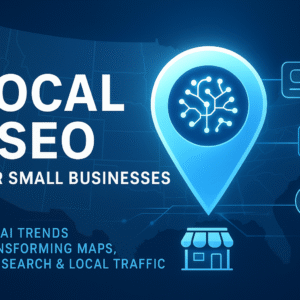The legal industry has fundamentally changed how clients discover and evaluate attorneys. Recent industry data shows that 96% of people seeking legal services now begin their search online, making a strategic approach to search visibility critical for law firms of all sizes.
If you’re a solo practitioner or managing partner wondering whether investing in a comprehensive Law Firm SEO package makes sense for your practice, this guide breaks down exactly what you’re getting, why it matters, and how to evaluate providers effectively.
What’s Actually Included in a Professional Law Firm SEO Package?
A legitimate law firm SEO package goes far beyond adding keywords to your website. Here’s what comprehensive services include:
Technical Website Infrastructure
Your website’s technical health directly impacts both user experience and search rankings. Professional packages address:
- Site speed optimization: Pages should load in under 3 seconds. Studies show that 53% of mobile users abandon sites that take longer than 3 seconds to load.
- Mobile responsiveness: With over 60% of legal searches happening on mobile devices, your site must function flawlessly across all screen sizes.
- Security protocols: HTTPS encryption is now a ranking factor and builds visitor trust.
- Clean site architecture: Proper URL structures, XML sitemaps, and internal linking that helps both users and search engines navigate your content.
Many firms discover their website has critical technical issues only after hiring an SEO provider to conduct a comprehensive audit.
Strategic Content Development
Content creation forms the core of modern legal SEO. Quality packages include:
Practice area pages that go beyond basic descriptions to address specific client concerns, typical case processes, and realistic outcome expectations. For example, a personal injury page should explain the claims process, typical timelines, and what constitutes a strong case.
Educational blog content answering real questions potential clients search for. Rather than writing for other attorneys, effective content addresses searches like “what happens if I can’t work after an accident” or “how long does a divorce take in [your state].”
Attorney profiles showcasing credentials, experience, case results (where ethically permitted), and professional background. These should read as professional narratives, not just resume listings.
FAQ sections using structured data markup to increase visibility in AI-powered search results and featured snippets.
Local Search Optimization
Most law firms serve specific geographic areas, making local SEO crucial:
- Google Business Profile management: Optimization, regular posts, review management, and photo updates that keep your profile active and engaging.
- Local citation building: Ensuring your firm’s name, address, and phone number appear consistently across 50-100+ online directories, from legal-specific platforms like Avvo and Martindale to general directories like Yelp.
- Location-specific content: Pages optimized for each city or region you serve, addressing local legal nuances when relevant.
- Review generation strategies: Ethical systems for encouraging satisfied clients to share their experiences online.
The local “map pack” – those three businesses appearing at the top of local searches – drives significant traffic. Comprehensive packages include strategies specifically targeting these prominent positions.
Link Building and Authority Development
Your website’s authority comes partially from other reputable sites linking to your content. Quality packages include:
- Outreach to legal publications and industry blogs
- Digital PR to earn mentions in local news outlets
- Guest contribution opportunities on relevant platforms
- Reclaiming unlinked brand mentions
- Building relationships with complementary legal practices for referral partnerships and link exchanges
It’s important to note: legitimate link building takes time. Providers promising hundreds of backlinks quickly are likely using tactics that could harm your site.
Why Your Referral Network Alone Isn’t Enough Anymore
Many attorneys built successful practices primarily through referrals and networking. While these remain valuable, client behavior has fundamentally shifted.
Potential clients now research multiple firms before making contact. They’re forming opinions about your practice based on:
- How easily they found you in search results
- The quality and depth of information on your website
- Reviews from past clients
- How your online presence compares to competing firms
Your SEO presence works continuously – attracting potential clients at 2 AM on Sunday when someone’s dealing with a legal crisis, or during their lunch break when they’re researching options.
Consider: even referred clients typically research your firm online before calling. Your digital presence either reinforces the referral or creates doubt.
How AI Search Changes the Game for Law Firms
The emergence of AI-powered search through ChatGPT, Google’s AI Overviews, Perplexity, and similar tools requires adapting your SEO approach.
Conversational Query Optimization
AI tools respond to natural language questions. Your content strategy should address queries as people actually ask them:
- “What should I do immediately after a car accident?”
- “Can I get full custody if my ex has a DUI?”
- “How much does it cost to set up an LLC?”
Rather than just targeting keyword phrases, think about the complete questions surrounding your practice areas.
Structured Data Implementation
Schema markup helps AI systems understand and extract information from your content. For law firms, implementing:
- Attorney schema with credentials and specializations
- Legal service schema describing what you offer
- FAQ schema for common questions
- Review schema for client testimonials
This structured information makes it more likely AI tools will reference your content when answering legal questions in your practice areas.
Featured Snippet Positioning
AI search tools frequently pull from featured snippets – those boxed answers appearing at the top of search results. Format content to win these positions:
- Use clear, direct headings that match common questions
- Provide concise definitions (40-60 words) for legal terms
- Use bullet points and numbered lists for process explanations
- Include tables comparing options when relevant
Evaluating SEO Package Providers: What to Look For
The legal industry has unique requirements that generic SEO agencies may not understand. Here’s how to evaluate potential providers:
Legal Industry Experience
Ask potential providers:
- How many law firms do they currently serve?
- Do they understand attorney advertising rules in your jurisdiction?
- Can they provide case studies from firms similar to yours?
- How do they handle client confidentiality in case studies and testimonials?
Providers familiar with legal marketing understand that bar associations have specific rules about attorney advertising. They know which tactics comply and which create ethical issues.
Transparent, Understandable Reporting
Quality providers deliver monthly reports showing:
- Ranking positions for target keywords
- Organic traffic growth over time
- Engagement metrics (time on site, pages per session, bounce rate)
- Lead generation (contact form submissions, phone calls)
- Competitive positioning in your market
Reports should be clear enough for non-technical attorneys to understand progress. Beware providers using jargon to obscure lack of results.
Customized Strategy, Not Templates
Your firm faces unique competitive pressures. A divorce practice in Des Moines needs different strategies than a patent litigation firm in Silicon Valley. During sales conversations, providers should ask detailed questions about:
- Your specific practice areas and ideal clients
- Your competitive landscape
- Your current online presence
- Your business development goals
- Your ethical obligations and restrictions
If a provider offers a one-size-fits-all package without asking these questions, they’re likely using cookie-cutter approaches.
Realistic Timelines and Expectations
Legitimate SEO providers set realistic expectations:
- Meaningful results typically emerge after 4-6 months
- Competitive keywords may take 8-12 months to rank well
- Results compound over time rather than happening overnight
Run from providers guaranteeing specific rankings or promising page one positions within 30-60 days. Search rankings depend on too many variables for such guarantees, and Google’s algorithm changes constantly.
Investment Expectations: What Does This Actually Cost?
Law firm SEO packages typically range from $2,000 to $10,000+ monthly, varying based on:
- Market competitiveness: Major metropolitan areas with many competing firms require more aggressive strategies
- Firm size: Multi-partner firms with multiple practice areas need broader optimization than solo practitioners
- Current baseline: Firms starting from scratch require more initial work than those with established websites
- Geographic scope: Firms serving entire states or multiple cities need more location-specific optimization
While these monthly investments seem substantial, consider the math: acquiring one client through SEO can generate $10,000-$100,000+ in revenue depending on practice area. If your SEO investment brings 2-3 quality clients monthly, the ROI is clear.
Compare SEO costs to traditional advertising. A single Yellow Pages ad or billboard might cost similar amounts with less measurable impact and no lasting value. Your SEO investment builds cumulative assets – content, rankings, and authority that continue delivering results.
Timeline to Results: What’s Realistic?
Understanding SEO timelines helps set appropriate expectations:
Months 1-2: Technical improvements, initial content creation, and strategy implementation. You’ll see minimal ranking changes but significant groundwork being laid.
Months 3-4: Initial ranking improvements for less competitive keywords. You may start seeing traffic increases for specific practice area pages.
Months 5-6: More significant traffic growth. You should see leads beginning to come through organic search. Rankings for competitive terms start improving.
Months 7-12: Compound effects become visible. Traffic growth accelerates, rankings for competitive terms improve significantly, and lead generation becomes consistent.
Year 2+: Established authority in your practice areas. Consistent top rankings, strong traffic, and reliable lead flow. Your firm becomes increasingly difficult for competitors to displace.
Firms that commit to 12-18 month strategies consistently outperform those expecting quick wins.
Beyond Rankings: What Actually Matters
While ranking positions matter, they’re means to an end. Focus on metrics that impact your practice:
Lead Quality and Quantity
Track not just how many contact forms you receive, but:
- How many convert to consultations?
- How many consultations convert to retained clients?
- What’s the average case value from organic search clients?
- How does lead quality compare to other sources?
Some firms discover that while SEO delivers fewer leads than paid ads, those leads convert at much higher rates because they’ve spent time engaging with educational content.
Market Visibility
Your brand should appear consistently when potential clients search for services you provide. Track:
- Share of voice in your market (how often you appear vs. competitors)
- Branded search growth (people searching specifically for your firm name)
- Direct traffic increases (people typing your URL directly)
These indicate growing brand recognition in your market.
Client Acquisition Cost
Calculate what you spend acquiring each client through SEO versus other channels:
SEO Client Acquisition Cost = Monthly SEO Investment ÷ New Clients from Organic Search
Compare this to paid advertising, events, or other marketing channels. Most firms find SEO delivers lower client acquisition costs over time, though it requires patience initially.
Common Mistakes Law Firms Make with SEO
Expecting Overnight Results
The most common mistake is abandoning SEO after 2-3 months because results aren’t dramatic yet. SEO is a long-term strategy that compounds over time.
Choosing Based Solely on Price
The cheapest provider rarely delivers the best results. Very low-cost SEO often relies on shortcuts and outdated tactics that can harm your site long-term.
Not Providing Input on Content
Your SEO provider needs your expertise. Content performs best when attorneys review it for accuracy and add specific insights from their experience. Don’t be completely hands-off.
Ignoring User Experience
SEO isn’t just about search engines – it’s about making it easy for potential clients to find information, understand their options, and contact you. Sites optimized purely for search engines without considering user experience ultimately underperform.
Inconsistent Effort
Starting and stopping SEO campaigns wastes momentum. Competitors who maintain consistent efforts will overtake you during gaps in your strategy.
Taking Action: Next Steps for Your Firm
If you’re ready to explore SEO for your practice:
- Audit your current situation: Use free tools like Google Search Console and Google Analytics to understand your current traffic and visibility. Search for your key services plus your location to see where you rank.
- Research potential providers: Schedule consultations with 3-4 firms. Ask about their experience with law firms, their process, reporting, and pricing. Request references from current legal clients.
- Set clear goals: Define what success looks like for your practice. Is it more consultation? Better quality clients? Reduced dependence on paid advertising? Clear goals help providers develop appropriate strategies.
- Commit to timeline: Understand that meaningful SEO results take 6-12 months. Budget accordingly and set expectations with firm leadership about when to evaluate ROI.
- Plan for involvement: While providers handle technical work, successful campaigns require some attorney input for content accuracy and strategic direction.
The legal market grows more competitive online every year. Firms investing in a comprehensive Law Firm SEO package now are building sustainable advantages over competitors still relying solely on traditional methods.



